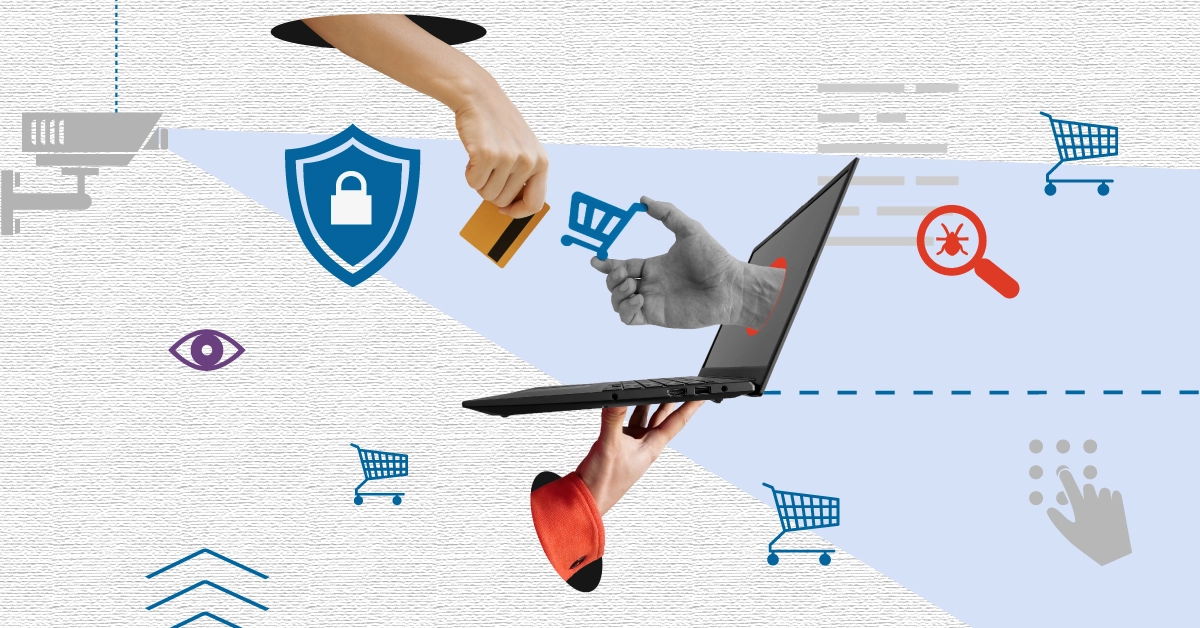
The growth of E-Commerce has changed the way we shop, bringing convenience and a vast array of products to our fingertips. However, this digital revolution has also given rise to cyber threats. Online stores are prime targets for hackers and cybercriminals seeking to exploit vulnerabilities in the pursuit of financial gain or to compromise sensitive customer data.
So how can online store owners protect their businesses and customers from these online threats?
The E-Commerce Landscape
E-Commerce has boomed in recent years, with an increasing number of consumers choosing to shop online. Global E-Commerce sales are expected to total $5.8 trillion worldwide in 2023 and that figure is expected to grow further over the next few years. This explosive growth has made online stores attractive targets for cybercriminals.
The Risks of E-Commerce
Online stores handle a wealth of sensitive information, including customer data, payment details, and business transactions. This large amount of data is what makes E-Commerce websites so appealing to cybercriminals. Here are five of the most significant risks associated with E-Commerce:

- Data Breaches: The theft of customer data is a significant concern for online retailers. Cybercriminals can exploit vulnerabilities in an E-Commerce platform to access customer information such as names, addresses, credit card numbers, and more. This not only harms the customers but also severely damages the reputation of the attacked business.
- Payment Fraud: E-commerce platforms are often targeted for payment fraud. Hackers can use stolen credit card information to make fraudulent purchases, leading to financial losses for both customers and merchants.
- Phishing Attacks: Phishing is a common tactic used by cybercriminals to trick users into revealing their personal and financial information. E-Commerce businesses can be impersonated in phishing attacks, and unsuspecting customers may be lured into disclosing sensitive data.
- Malware and Ransomware: Malicious software can infiltrate an E-Commerce website or its servers, compromising security and potentially encrypting data. Ransomware attacks can lead to extortion demands.
- Vendor Vulnerabilities: Third-party vendors and plugins used on E-Commerce platforms can introduce vulnerabilities. If one of these vendors experiences a data breach, the online store can also be compromised.
E-Commerce Security Best Practices
To protect your online store from cyber threats, it is crucial to implement strong security measures. Here are some best practices to help safeguard your E-Commerce business:
- Secure Your Website with SSL: Implement Secure Sockets Layer (SSL) certificates to encrypt the data transmitted between your website and customers' browsers. SSL ensures that sensitive information, like payment details, is protected from interception.
- Regularly Update and Patch: Keep your E-Commerce platform and all associated software up to date. Software updates often include security patches that address known vulnerabilities.
- Use Strong Authentication: Require strong, unique passwords for all user accounts. Implement two-factor authentication (2FA) to add an extra layer of security to login processes.
- Regular Security Audits: Conduct regular security audits and vulnerability assessments of your website and infrastructure. Identify and address weaknesses before cybercriminals can exploit them.
- Regular Backups: Regularly back up your website and database. In case of a ransomware attack or other data loss, having recent backups can save your business from a catastrophic loss.
- Third-party Vendor Assessments: Before integrating third-party vendors or plugins, assess their security measures and practices. Ensure that they meet your security standards.
- Secure Hosting: Choose a reputable and secure hosting provider that offers features like server-side security and regular security updates.

E-Commerce security is of paramount importance in today's digital landscape. The risks associated with online shopping are real, and the consequences of a security breach can be devastating for both businesses and customers. Implementing robust security measures, staying informed about the latest cyber threats, and regularly assessing and improving your security are essential steps for safeguarding your online store.
Cyber threats will continue to evolve, and E-Commerce businesses must adapt to these challenges. By prioritising security, online retailers can build trust with their customers and protect their reputation, ultimately ensuring the long-term success of their digital ventures.
E-commerce website design and development with BBI Brandboost
At BBI Brandboost we understand that the success of your E-Commerce business hinges on more than just marketing strategies; it is also about providing a secure and seamless online shopping experience for your customers. With our proven expertise in web development and E-Commerce solutions, we can design and develop a secure E-Commerce website for your business. To find out more about our services and discuss your E-Commerce requirements please contact us now. Remember, security is not a choice, it is a necessity.